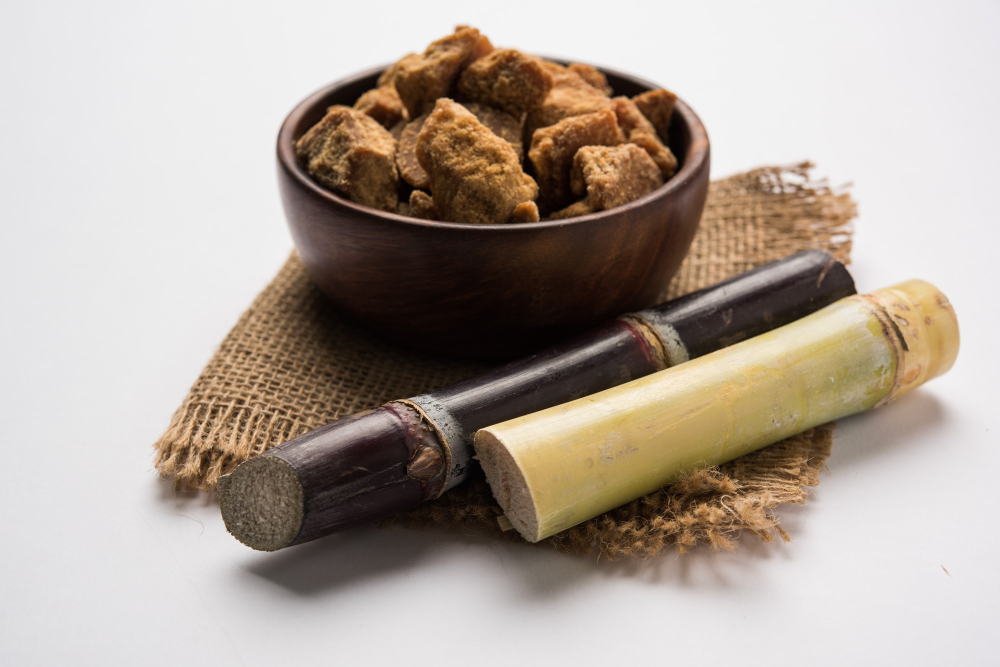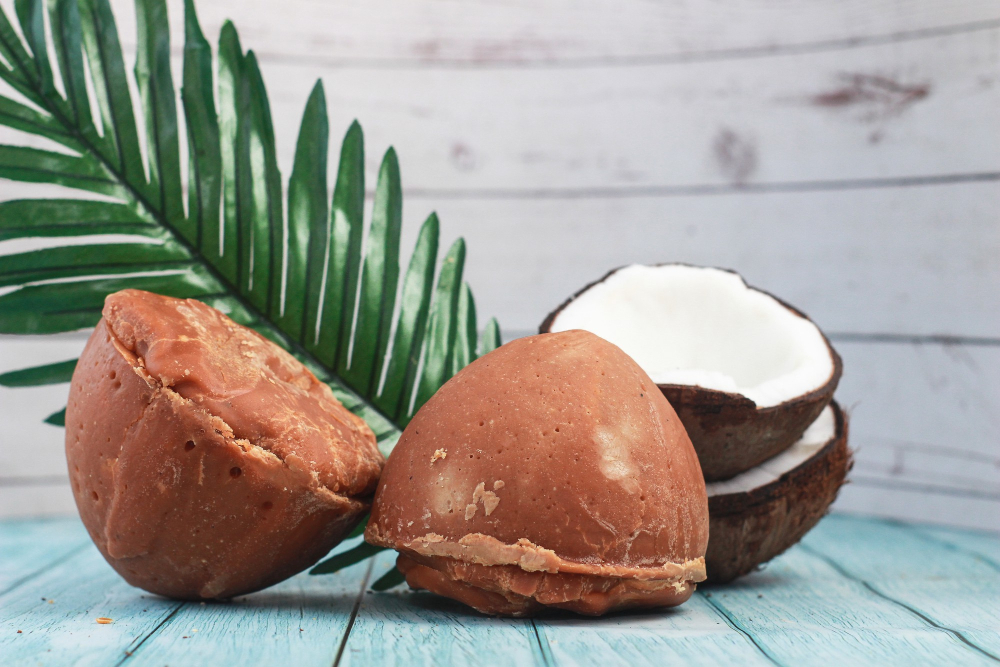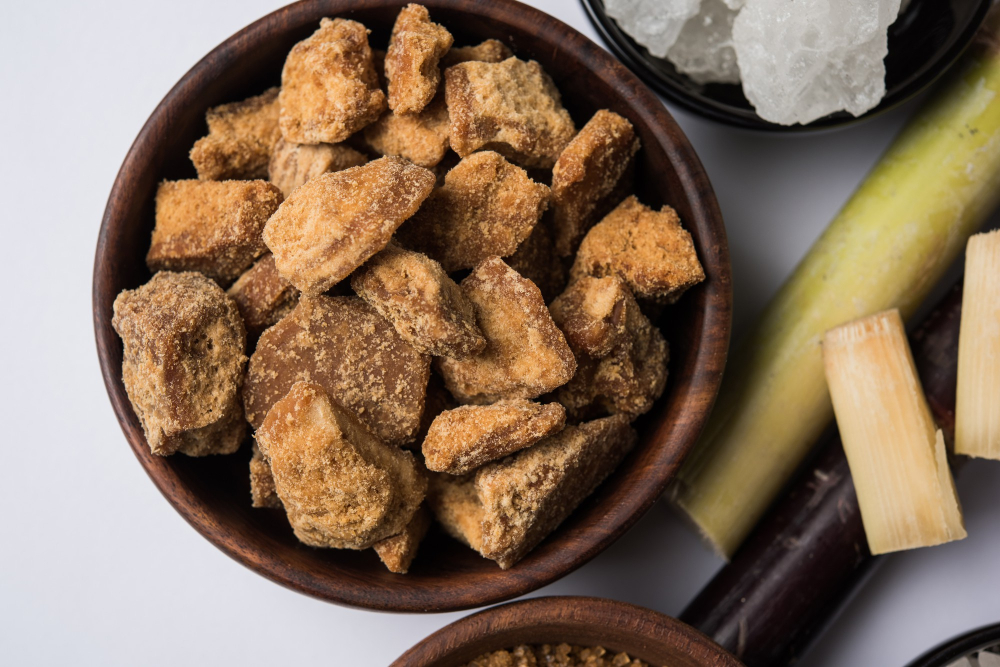Jaggery, also known as sugar candy, is a popular Indian sweet made from sugarcane juice and dates. Rich in minerals and vitamins, jaggery is a great source of beneficial nutrients.
It can help you in managing diabetes, heart diseases, and blood pressure. It even has anti-cancer properties. Let’s explore the top 10 benefits of jaggery and why you should include it in your regular diet.
In this article, we highlight the many benefits of consuming jaggery.
History of Jaggery
Jaggery is a traditional sweetener that dates back to ancient India. It is made by boiling the juice extracted from sugarcane in water until it thickens. Jaggery has been used for centuries as a sweetener, preservative and medicine.
Jaggery is known by different names in different parts of the world. In India, it is known as gur or gud. In southern India, it is called karupatti or nul.
The word “jaggery” comes from the Sanskrit word “yakshya” which means “medicine”.
Jaggery is produced in many countries including India, Brazil, Sri Lanka, Nepal and Thailand. It has been used for centuries as a sweetener and preservative when making pickles and chutneys because of its antibacterial properties.
Jaggery has also been used to preserve medicinal herbs for medicinal uses.
In Ayurveda, jaggery is known as the one of the best remedies for an upset stomach and heartburns because of its antacid properties. It also helps treat constipation by softening stools and speeding up digestion.
Ayurvedic healers recommend jaggery to treat coughs and colds, urinary tract infections, arthritis and even depression.
In India, jaggery is used in many different recipes. It is used in savory dishes as well as sweet dishes. It is commonly a sweetener for savory dishes such as pickles, chutneys and curries such as the “jaggery” flavored “korma”.
The word korma comes from the Hindi word “kurm”, which means gur or jaggery. Jaggery is also used to make desserts such as “gulab jamun”, a popular Indian dessert which consists of small balls of dough soaked in a sugar syrup flavored with cardamom seeds, saffron and rose water.
Jaggery can also be used to make sweets such as halvas and fudge. In some places, it is used to make traditional rice pudding known as “payasa”. It can also be used to make a drink called lassi which tastes similar to buttermilk.
In Tibet, the monks use jaggery and butter in their tea.
In Nepal, jaggery is often used in a traditional beverage called “Thaa”. Thaa is made by boiling jaggery with water and then adding cardamom powder to the liquid. It is then boiled some more before being served.

What does Jaggery have?
Jaggery is used as a sweetener in Indian desserts, chutneys and other savory dishes. It is also used to make jaggery syrup, which can be used as a drink or added to tea or coffee.
Jaggery can be consumed in its solid form by grating it and adding it to hot milk or ghee.
1. Jaggery is a great source of minerals and vitamins.
A 100-gm pack of jaggery contains the following nutrients (1):
Calcium – 66 mg
Iron – 2 mg
Magnesium – 58 mg
Phosphorus – 41 mg
Potassium – 300 mg
Sodium – 0.7 mg
Zinc – 0.3 mg
Copper – 0.2 mg
Manganese – 1.6 mcg
Selenium – 19 mcg
Vitamin C – 12.4 mg
Thiamine (Vitamin B1) – 0.01mg
Riboflavin (Vitamin B2) – 0.03mg
Niacin – 1.1 mg
Vitamin A – 1mcg
Vitamin E – 0.01mg
Retinol (Vitamin A) – 0.3 mcg
2. Jaggery is a good source of iron and calcium.
Jaggery contains a significant amount of iron and calcium. Iron is an essential mineral, which the body needs to produce red blood cells that carry oxygen throughout the body.
Calcium is one of the most important minerals in the body because it helps strengthen bones and teeth, and plays a role in nerve transmission, muscle contraction and blood clotting.
3. Jaggery contains antioxidants.
Antioxidants are compounds that help protect your cells from damage caused by free radicals.
Free radicals are highly reactive chemicals that can cause oxidative damage to your tissues and DNA, which may lead to chronic diseases like cancer.
Jaggery contains a number of antioxidants, including ascorbic acid (vitamin C), flavonoids, carotenoids and phenolic acids.
4. Jaggery is a good source of magnesium.
Magnesium is an important mineral that plays a vital role in numerous biological processes in the body. It is required for more than 300 biochemical reactions in the body, including protein synthesis and energy production.
Magnesium may also help lower your blood pressure and protect against heart disease and stroke by reducing blood clotting.
Jaggery contains magnesium, which accounts for around 10% of its total weight. This means that 100 grams of jaggery provides around 10 mg of magnesium.
The recommended daily intake of magnesium varies depending on age and gender, but it ranges from 400 to 420 mg per day for men and 310 to 320 mg per day for women.
5. Jaggery is a good source of copper.
Copper is an important mineral that’s required for the production of red blood cells and collagen, a protein found in connective tissues. It also plays a role in bone formation and helps maintain healthy skin.
Jaggery contains copper, which accounts for around 0.2% of its total weight. This means that 100 grams of jaggery provides around 2 mg of copper. The recommended daily intake of copper depends on age and gender, but it ranges from 900 to 1,100 mcg per day for men and 700 to 900 mcg per day for women.

The Top 10 Health benefits of Jaggery
Helps in managing diabetes
Diabetes is an inflammatory disease caused by the body producing excess insulin. Insulin, in turn, helps in transporting glucose through the body.
The lipids (fats) in the body are not broken down by insulin and are instead accumulated in the body. As a result, the blood sugar level remains high.
Jaggery’s ant-diabetic properties can do wonders in managing diabetes.
Simply put, by replacing sugar with jaggery, you can manage diabetes.
Jaggery is also a rich source of minerals like copper, zinc, selenium, manganese, and magnesium.
All these minerals help in managing diabetes and other heart problems.
Helps in heart diseases
Cardiac diseases are caused due to irregular heart rate and enlargement of the heart muscle.
Jaggery’s ‘āsan’ (a souring agent) and ‘asavarana’ (a smell that leads to digestion) properties make it effective in treating heart diseases.
A study was conducted to understand the effect of jaggery on the heart. Researchers compared the effect of regular jaggery and artificial sweetener on the heart.
In the study, researchers had divided the rats into two groups.
In the first group, rats were fed with artificial sweetener for 18 weeks.
In the second group, the rats were fed with regular jaggery.
After 18 weeks, researchers had found that the rats in the artificial sweetener group had developed irregular heartbeat and enlargement of the heart muscle.
However, when the rats were fed with jaggery, the same did not happen.
This means that regular consumption of jaggery can help in treating heart diseases and lead a healthy life.
Helps in blood pressure
High blood pressure is another common cardiac problem.
Jaggery, which is a rich source of minerals, can be used to treat high blood pressure.
One of the key reasons for developing high blood pressure is dietary patterns.
Consuming processed foods and excess fat leads to high blood pressure.
However, by replacing sugar with jaggery, you can prevent high blood pressure.
Plus, jaggery is also a good source of magnesium, which is another key mineral in preventing blood pressure.

Prevents cancer
Studies have shown that regular intake of jaggery can prevent cancer.
Studies have shown that regular copper intake can prevent cancer.
Copper is one of the minerals in jaggery.
Cancer is an inflammatory disease and an excess intake of copper can lead to an inflammatory response in the body.
By replacing sugar with copper-rich jaggery, you can prevent cancer.
Jaggery also has anti-oxidant properties, which can prevent cancer.
Has anti-oxidant properties
Cancer cells are very sensitive to oxidative stress.
As they grow and divide, they produce more oxidative stress in the body.
Anti-oxidant properties of jaggery can prevent cancer.
Studies have shown that regular intake of jaggery can help in preventing and managing diabetes, heart diseases, and cancer.
It has anti-oxidant properties that can prevent cancer and other diseases.
Good for skin and hair
Jaggery has anti-fungal properties that can prevent the itching caused by fungal infections like dandruff and athlete’s foot.
Skin is the largest organ of the body and is exposed to harmful UV rays from the sun.
On daily basis, we are exposed to harmful UV rays, which can damage and weaken our skin.
Regular intake of jaggery can prevent skin diseases like skin cancer and psoriasis.
Jaggery is a rich source of potassium and protein, which are two important components in skin nourishment and repair.
Enhances digestion
Digestion is the process of breaking down food into smaller molecules so that they can be absorbed by the body.
This breakdown of food is called ‘digestion’.
Jaggery, being a rich source of minerals, can improve digestion and enhance the nutrient absorption by the body.
It is recommended to take a copper-rich supplement before having jaggery to improve digestion.
The fiber content in jaggery helps promote healthy digestion by increasing the bulkiness of stool and helping it move through your digestive system more easily. Fiber also promotes regular bowel movements and relieves constipation.

Good for eyesight
Some foods produce free radicals, which can damage the eye’s retina and cause damage to the eyesight.
Jaggery has a strong anti-oxidant property, which can prevent damage to the eyesight.
It can also improve your eye-sight by maintaining the eyes’ health.
It is recommended to have jaggery as a part of your regular diet.
Good for muscle pain
Muscle pain is one of the most common health issues in the world.
People with chronic pain are often advised to eat foods that have magnesium and calcium in them.
Jaggery is a rich source of both of these minerals.
It can improve your nervous system and help in managing chronic pain.
Other benefits of Jaggery
Apart from the above benefits, jaggery is also a good source of protein and can be used for making sweets and snacks.
It is also a good source of carbs and fats, which can help in making healthy food choices and maintaining a healthy lifestyle.
It is recommended to have jaggery as a part of your regular diet.
Conclusion
Jaggery is a healthy sweet that aids in weight loss and provides many benefits for your health. Jaggery’s overall benefits come not only because they are successfully used as diabetes metabolism tips or because it is used to treat symptoms of diabetes but also from its unique composition.
Jaggery contains Anilangin that has the ability to remove toxins and free oxygen radicals from the body. Certain lab results showed that Anilangin, found in jaggery, was absorbed into parenchyma liver cells of rats and activated a detoxification mechanism. So, it did ‘cleanse’ them!
So, start using the Jaggery in favorite dishes and get the most benefits out of it!
















